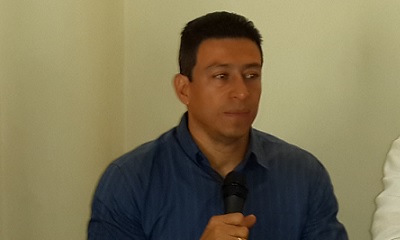Carrying forward USLEAP's long-standing focus on violence against trade unionists in Latin America, Sindicalistas bajo amenaza (“Trade unionists under threat”) highlights cases where urgent action is needed, gives updates on past cases, and features in-depth interviews with the brave men and women who continue to organize workers despite serious risks to their safety. By sharing their stories we hope to shine a light on how violence and threats continue to undermine the fundamental right to freedom of association across Latin America, while also putting governments (and other actors) on notice that the world is watching. We are grateful to the 21st Century ILGWU Heritage Fund for support for this interview series.
Our first “Sindicalistas” interview was with Óscar Arturo Orozco. In this installment, we meet Jorge Iván Vélez Calvo, the Sindicato de las Empresas Municipales de Cali – SINTRAEMCALI (Municipal Workers Union of Cali), who received multiple death threats, including receiving an invitation to his own funeral in the mail (pictured below). Special thanks to the Washington Office on Latin America (WOLA) for bringing Jorge's case to our attention and arranging an interview.
English Version:
June 30, 2014
Cali, Colombia
Since the 1990’s, the Colombian government has pursued an economic policy of market liberalization and privatization of public utilities. In the southern Colombian city of Cali, labor and community organizations, such as the Sindicato de las Empresas Municipales de Cali – SINTRAEMCALI (Municipal Workers Union of Cali), have been fighting to retain public control over their utilities. When many other Colombian municipalities privatized their utilities, including gas, water, and energy, large numbers of workers were fired and utility prices soared.
Due in part to its success in leading the resistance to the privatization of Cali’s public utilities, SINTRAEMCALI’s leaders and members have been under attack for over a decade. Many union members have received death threats (fifteen have been forced to flee Cali), some were blacklisted from employment, and eight have been assassinated.
In 2004, under President Álvaro Uribe, members of SINTRAEMCALI, labor rights activists, and human rights defenders were targeted in a detailed assassination plot and defamation campaign known as “Operation Dragon.” The plot was developed by retired members of the military, private contractors, and hired assassins to suppress the union’s advocacy for labor rights and stance against privatization. In addition to planning assassinations, the plotters tried to discredit the union by making false accusations that it was supporting the FARC guerrillas. 
Jorge Iván Vélez Calvo, President of SINTRAEMCALI, has been threatened with death numerous times for defending the rights of Colombian workers and working with international human rights organizations. In 2012, less than one month before the U.S.-Colombia Free Trade Agreement (FTA) entered into effect, Jorge received a package that included an invitation to his own funeral and a bullet with his figurative name on it.
The U.S. Congress approved the FTA only after the administrations of President Barack Obama and Colombian President Juan Manuel Santos developed a Labor Action Plan to address concerns about Colombia’s poor labor rights record. Among other reforms, the action plan promised to expand Colombia’s protection program for labor activists under threat of violence and increase the institutional capacity of the Attorney General’s office to reduce impunity and accelerate action on anti-union violence cases.
Additionally, in April of this year, a Colombian court ordered President Santos and Vice President Angelino Garzón to publicly apologize to SINTRAEMCALI for the previous administration’s attacks and slander against the union under Operation Dragon. Despite the Colombian government’s rhetoric and reforms, however, SINTRAEMCALI and other unions continue to be the targets of violence. Since the court order, threats directed at SINTRAEMCALI’s leaders have increased.
Five days after the court order, and around the three year anniversary of the Labor Action Plan, SINTRAEMCALI’s office in Cali was firebombed. The attack was recorded by a security camera, but the Attorney General’s investigation has yet to produce any results. Jorge is frustrated that even with video evidence no suspect has been detained and the authorities seem to be inattentive to the case.
On May 21, Jose Ernesto Reyes, Vice President of SINTRAEMCALI, and his family were roused from bed by noises outside their home. They found their car set ablaze. When Jose attempted to put out the fire, a flame caught his body and burned his legs. Jose was not protected under Colombia’s program for threatened labor activists even though violence against SINTRAEMCALI had increased and the union was demanding greater protective measures from the government.
Jorge wants all of SINTRAEMCALI’s leadership and its Claims Commission protected by the government because they all face the same risks. After the union office was firebombed, Jorge and two other leaders received bodyguards and bulletproof vests. Yet the government did not provide sufficient funds to hire a protective vehicle, a necessity for union leaders who are particularly vulnerable to armed attacks while travelling by car. Since the attack on Jose’s property, the government has assigned him similar protective measures and promises to deliver an armored vehicle shortly.
While the current administration of President Santos has taken steps towards fulfilling the Labor Action Plan, threats and violence continue to be common tools of union repression. Over the last decade, SINTRAEMCALI has lost over 40 percent of its membership, but Jorge and its leaders remain committed to fighting privatization and violations of workers’ rights: “The people of Cali support our work because they know we’re fighting not only for the union, but also for the right of the community to control its own public resources.”
Versión española:
Junio 30, 2014
Cali, Colombia
Desde los años 90, el gobierno colombiano ha asumido una política económica de la liberalización del mercado y privatización de los servicios públicos. En la ciudad Cali, el Sindicato de las Empresas Municipales de Cali (SINTRAEMCALI) ha estado luchando para preservar el control público de las utilidades. Cuando muchos municipalidades colombianos privatizaron sus utilidades, incluyendo petrol, agua y energía, muchos trabajadores fueron despedidos y los precios de las utilidades públicas crecieron mucho.
En parte debido al éxito del SINTRAEMCALI en la lucha contra privatización de las utilidades públicas de Cali, los dirigentes y miembros del sindicato han sido bajo ataque por más que una década. Muchos miembros del sindicato han recibido amenazas (quince se han visto obligados a huir de Cali), algunos fueron puesto en la lista negra, y ocho han sido asesinato.
En 2004, bajo el presidente Álvaro Uribe, miembros del SINTRAECALI y activistas por los derechos humanos fueron dirigidos en una detallada complot de asesinato y difamación que se llama “Operación Dragón.” El complot fue creado por militares retirados, contratistas privados, y sicarios para suprimir las campañas del sindicato en contra de la política estatal de la privatización. Además de la conspiración de asesinato, los conspiradores trataron de desacreditar al sindicato por hacer falsas acusaciones que apoyaba a los guerrillas de la FARC.
Jorge Iván Vélez Calvo, el presidente de SINTRAEMCALI, ha sido amenazado de muerte muchos tiempos por su defensa de los derechos de trabajadores colombianos y su trabajo con organismos de derechos humanos internacionales. En 2012, menos de un mes antes del comienzo del Tratado de Libre Comercio (TLC) entre los Estados Unidos y Colombia, Jorge recibió un paquete que contuvo una invitación a su propio funeral y una bala marcado para él.
El Congreso estadounidense aprobó el TLC sólo después de las administraciones del presidente estadounidense, Barack Obama, y el presidente colombiano, Juan Manuel Santos, desarrollaron un Plan de Acción Laboral para dirigirse a la historia mala de los derechos laborales en Colombia. Entre otras reformas, el Plan de Acción Laboral promesó a ampliar el programa de protección para los activistas sindicales bajo amenaza y aumentar la capacidad institucional del Fiscal para reducir la impunidad y acelerar la acción en casos de violencia antisindical.
También en el mes de abril de este año un tribunal colombiano mandó al presidente Santos y vicepresidente Angelino Garzón a pedir perdón públicamente a SINTRAEMCALI por los ataques y difamación contra el sindicato bajo la Operación Dragón de administración anterior. A pesar de la retorica y reformas del gobierno colombiano, SINTRAEMCALI y otros sindicatos continúan estar los objetivos de la violencia. Desde el mandato judicial, las amenazas contra los dirigentes de SINTRAEMCALI han incrementado.
Cinco días después del mandato judicial, y cerca del tercer aniversario del Plan de Acción Laboral, bombas incendiarias fueron lanzadas contra la sede de SINTRAEMCALI. Una camera de seguridad grabó el ataque pero la investigación del Fiscal no ha producido ningún resultado. Jorge se siente frustrado que aún con la evidencia video ningún sospechado ha sido detenido y los autoridades parecen estar poco interesado en el caso.
El 21 de Mayo, José Ernesto Reyes, vicepresidente of SINTRAEMCALI, y su familia escucharon ruidos en la calle y se dieron cuenta que su vehículo estacionado al frente de la residencia estaba incendiando. José intentaba a apagar el fuego cuando una llamarada más fuerte le alcanzó y él sufrió quemaduras en sus piernas. José no estaba protegido bajo el programa gubernamental para los activistas sindicales bajo amenaza aunque la violencia contra SINTRAEMCALI ha incrementado y el sindicato estaba solicitando al gobierno para las medidas de emergencia.
Jorge quiere que todos los dirigentes de SINTRAEMCALI estén protegidos por el gobierno porque todos enfrentan el mismo riesgo. Después del ataque contra la sede sindical, Jorge y dos otros dirigentes recibieron escoltas y chalecos antibalas. Pero el gobierno no proveyó fundos suficientes a contratar una persona con un vehículo blindado, que es necesario para sindicalistas quien están más vulnerables a los ataques armados cuando viajan por carro. Desde el ataque contra José, el gobierno le ha asignado a él medidas de emergencia similares y promesa a entregar un vehículo blindado muy pronto.
Mientras la administración de presidente Santos ha tomado medidas hacia el cumplimiento del Plan de Acción Laboral, la violencia y amenazas contra sindicalistas no ha disminuido suficientemente. Trabajadores colombianos continúan a faltar el derecho fundamental de libertad sindical. Durante el década pasado, SINTRAEMCALI ha perdido más que 40 por ciento de su afiliación, pero Jorge y otros dirigentes siguen comprometidos con la lucha contra privatización y un mayor respeto por los derechos laborales: “La comunidad aquí en Cali nos apoyan nuestra trabajo porque saben que estamos luchando no solo para el sindicato pero también para el derecho de la comunidad a gestionar sus mismos recursos públicos.”